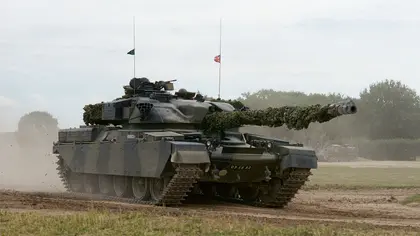An undisclosed number of British Chieftain MBT are being refurbished at a British repair yard in preparation for use in combat in Ukraine, Ukrainian news reports said on Wednesday, July 19.
Ukrainian military reporter Roman Bochkala posted video and images that showed of one of the 1970s-designed tanks in a British maintenance yard. In video he said “British friends” and “volunteers” were overhauling the vehicle and that, potentially, “many more” mothballed Chieftains would be available for field use by the Armed Forces of Ukraine (AFU).
Bochkala implied, but did not say directly, that the tank or tanks were being drawn from privately-owned, non-government stocks. Images posted by Bochkala showed a single Chieftain tank with chipped paint, spots of rust and other signs of long-term outdoor storage. The AFU would ultimately receive multiple Chieftain tanks following repairs, he said.
- See the latest war in ukraine update in the Kyiv Post’s news bulletins released today.
- Look at the most up-to-date Ukraine news that came out today.
JOIN US ON TELEGRAM
Follow our coverage of the war on the @Kyivpost_official.
Chieftains were fielded primarily by Britain, Jordan, Kuwait, Iran and Iraq. In the 1980s it was considered to be among the world’s best tanks, particularly because of its a rifled 120mm main armament which was able to knock out any opposing vehicle at ranges up to three km.
Later upgrades of the tank included retro-fitting of enhanced “Stillbrew” armor which gave increased protection against the firepower of potential opponents. The Chieftain was phased out by the British military in the early 2000s to make way for the next-generation Challenger tank.

Zelensky Meets CIA Director William Burns in Ukraine
The Chieftain’s weakness was widely considered to be its overly-complicated Rolls Royce-designed/Leyland-manufactured 6-cylinder, 12-piston two stroke diesel engine, which was prone to overheating and breakdowns. It was considered particularly difficult to maintain because many of its expendable parts were inaccessible being hidden deep inside the engine compartment requiring the entire engine pack to be removed, a process that needed a team of skilled mechanics an entire day to conduct even minor repairs.
A joke common among British operators of the day was that the Chieftain tank was the world’s best fighting vehicle provided it broke down exactly where it was needed on the battlefield.
More than 30 years after working on Chieftains one retired mechanic recalled in comment to Kyiv Post: “I remember that tankie VMs (vehicle mechanics) were invariably covered in oil, and forever cursing the Chieftain. I prayed never to get sent to a tank regiment.”
The Bochkala video showed an early-model Chieftain which lacked the Stillbrew upgrade and misidentifies the vehicle as a Challenger 1. The Chieftain’s engine compartment was open on the video where a mechanic speaking English with a southern accent can be heard.
The Jordanian version of the Chieftain was fitted with a more reliable Perkin Engines power plant, which the British military later used in the follow-on Challenger tank. According to open sources, the Jordanian army has mothballed 300 tanks from its Chieftain fleet that, theoretically, could become a source of tanks for the AFU. Aman generally – but not always – has voted in support of Ukraine in UN resolutions on the war.
The highest-profile privately-financed delivery of armored vehicles to Ukraine was completed in May 2023, following a collection of the equivalent of $6.37 million by a social activist group led by high-profile Ukrainian actor and television presenter Serhiy Pritula. The initiative handed around a hundred obsolete, but still functional British army armored personnel carriers from the Falklands War-era, including venerable Spartan and Bulldog vehicles to the AFU.
In recent months the UK has donated 28 of its top-line Challenger 2 tanks to the AFU as a government-to-government transfer. Crew training was completed in England in May and, according to AFU statements the tanks will be deployed to combat units, although, to date Kyiv has not acknowledged committing its Challengers to actual combat during it’s summer offensive. By most metrics the Challenger remains the most powerful armored vehicle currently fielded by either side in the Russo-Ukraine War.

British-manufactured Chieftain tank modified for use by the Royal Jordanian Army. Undated photograph from the Tank Museum, Bovington, UK.
You can also highlight the text and press Ctrl + Enter






